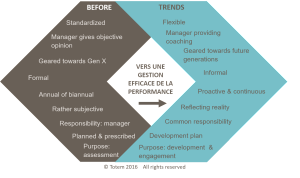
Performance management is the new hot topic for numerous blogs and discussion forums. This should not come as a surprise considering its role in the overall performance of a company, its estimated cost of more than $7,000 per manager[1], legal repercussions in case of employment termination, and the shortfalls of the traditional formal approach as evidenced by numerous studies (evaluation of competencies and behaviors, employee self-assessment, and linking of individual ratings to compensation decisions)[2]. It is also unsettling that one of the most important assets of any company, its human capital, is reviewed and assessed only every six or twelve months.
Nowadays, in the context where companies promote employee accountability and entrepreneurship, it would be imprudent to put almost all performance review responsibilities in the hands of managers. This approach also goes against the personality of Gen Y and younger workforce who are known for their “right here right now” attitude and a shift in their relationship with authority. They wouldn’t wait patiently for six months or a year to be told what they do right or what they do wrong. They prefer to receive feedback right away. Just think about young people who post pictures or write on social networks and absolutely need to get as many likes as possible right away.
The performance management process is a broad category. It serves to provide feedback, engage employees, analyze developing needs, set individual objectives, etc. Even top performers find this process dreadful. There is a good reason for that: David Rock, the Director of the NeuroLeadership Institute and the author of “Your Brain at Work”, states that performance reviews, such as the ones done by most companies, activate the pain center in the brain which provokes intense reactions from people and causes them to feel under attack.
Employees and managers agree that this process, which ironically is used to evaluate the performance of an individual, is lacking in performance itself…
WHY EMPLOYEES ARE SKEPTICAL
WHY MANAGERS ARE FRUSTRATED
TRANSITION TRENDS
We are witnessing the arrival of major new trends at the level of change management philosophy.

RESULTS SPEAK LOUD AND CLEAR
Companies that abolished the traditional rating-based performance system and adopted innovative solutions saw impressive improvements. Here are a few examples:
SOLUTIONS OF TOMORROW
Organizations look to develop an effective performance review process in accordance with their organizational needs, but also in consideration of the wishes of their employees, representing all generations, according to Harvard Business Review. Employees want to:
Many companies are adopting new performance management models, such as a voluntary approach, crowdsourcing, coaching and peer review. However, be careful not to fall into the trap of copy-pasting the solutions used at other organizations. Finding your own winning formula is essential and, above all, it must be in line with your corporate culture, it must agree with your business processes and it must be supported by skilled managers. Unfortunately, a Mercer survey report shows that managers often lack the necessary skills to properly assist their organization in its performance management tasks: only 3% to 14% are highly skilled, 38% to 65% are moderately skilled, and 21% to 59% are marginally skilled[11].
These alarming statistics reveal the urgent need to give managers the necessary tools and to adequately manage change in order to ensure solid positive results. The Totem team could help you with the design and implementation of a new approach to performance management.
Sylvie Grégoire, MBA, CRHA
President, Totem Performance organisationnelle
[1] An average manager (salary of $60,000/year) dedicates over 200 hours a year on tasks related to performance reviews, Why Employee Performance Reviews Are So Old School, The Washington Post
[2] Global Performance Management Trends, Mercer
[3] The Absolute Guide to Performance Reviews, TINYpulse, Globoforce survey
[4] The Four Question Review to Avoid, Sabrina Son, tumblr.com
[5] The Absolute Guide to Performance Reviews, TINYpulse, Globoforce survey
[6] The Performance Review Trend You Need to Jump On Now, Sabrina Son, August 2015
[7] The Future of Performance Management: 2015 and Beyond, Geese webinar
[8] Trends in Performance Management, March 2015, bridgeinnovate.com
[9] Trends in Performance Management, March 2015, bridgeinnovate.com
[10] The Absolute Guide to Performance Reviews, TINYpulse, Globoforce survey
[11] Percentages vary depending on the surveyed areas relevant to performance management